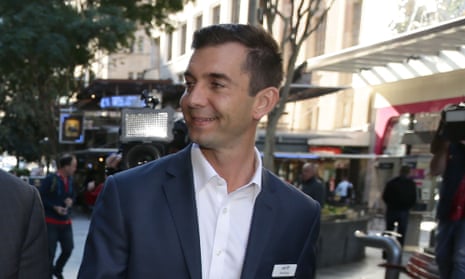The federal government is preparing to unveil “ambitious” new targets that will require all states and territories to spend a portion of their procurement budgets on recycled materials for public projects.
New waste reduction minister, Trevor Evans, who is the first person to hold the portfolio at a federal level, said he would seek agreement from state and territory environment ministers for the new target at their next meeting, expected before the end of the year.
The move is aimed at kickstarting a domestic commercial market for Australian waste, responding to a growing crisis in the sector after China stopped importing plastic recyclables, and after other south-east Asian countries, including Indonesia, rejected shipments of Australian waste.
Evans told Guardian Australia that the “ambitious” procurement target would be backed up with financial support from the commonwealth to help support the burgeoning recycling manufacturing sector.
“I would like to see all of the states and the commonwealth agree that by X date, X percentage of their significant procurement programs will be made of recycled materials,” Evans said.
While he declined to nominate the target, he said it needed to be sufficient to kickstart the manufacturing sector and would likely deal with stockpiles of recyclables that have accumulated because there have been no willing buyers of the waste.
The push comes as the federal government prepares to embark on a $100bn infrastructure program over the next decade, with about $42bn of that slated for the next four years.
“We need a critical mass of demand in order to help business and innovators come up with the supply solution,” he said.
“There are some significant stockpiling problems around Australia, where I think if we can create markets for demand, that would be our best possible chance of realising the value of those stockpiles.
“I am very ambitious when it comes to the targets I would like to see government adopt [and] I think there are some very big opportunities that will drive some big steps forward.”
Evans said that once a target was set, it would be left to state governments to determine which projects were best suited to use recyclables, suggesting roads, public transport and water infrastructure could all be contenders.
New procurement targets have been backed by environmental and industry groups, who say a domestic recycling market would prevent recyclable material kept in Australia sitting in stockpiles or going to landfill. Currently about 90% of waste that does not go to landfill stays in Australia and 10% is exported.
The Coalition went to the election promising a $167m Australian recycling investment package, which it said would increase recycling rates, tackle plastic waste and litter and halve food waste by 2030.
Most of this funding – about $100m – is earmarked for recycling manufacturing.
Evans said the government wanted to see progress made on the reduction of single-use plastic, but that the issue was “complex” and would require cooperation from states and industry.
“There won’t be a silver-bullet solution,” he said.
“Everybody has a role to play, and in some of these complex areas it is going to be critical to ensure that industry is a big part of the solution.”

Comments (…)
Sign in or create your Guardian account to join the discussion